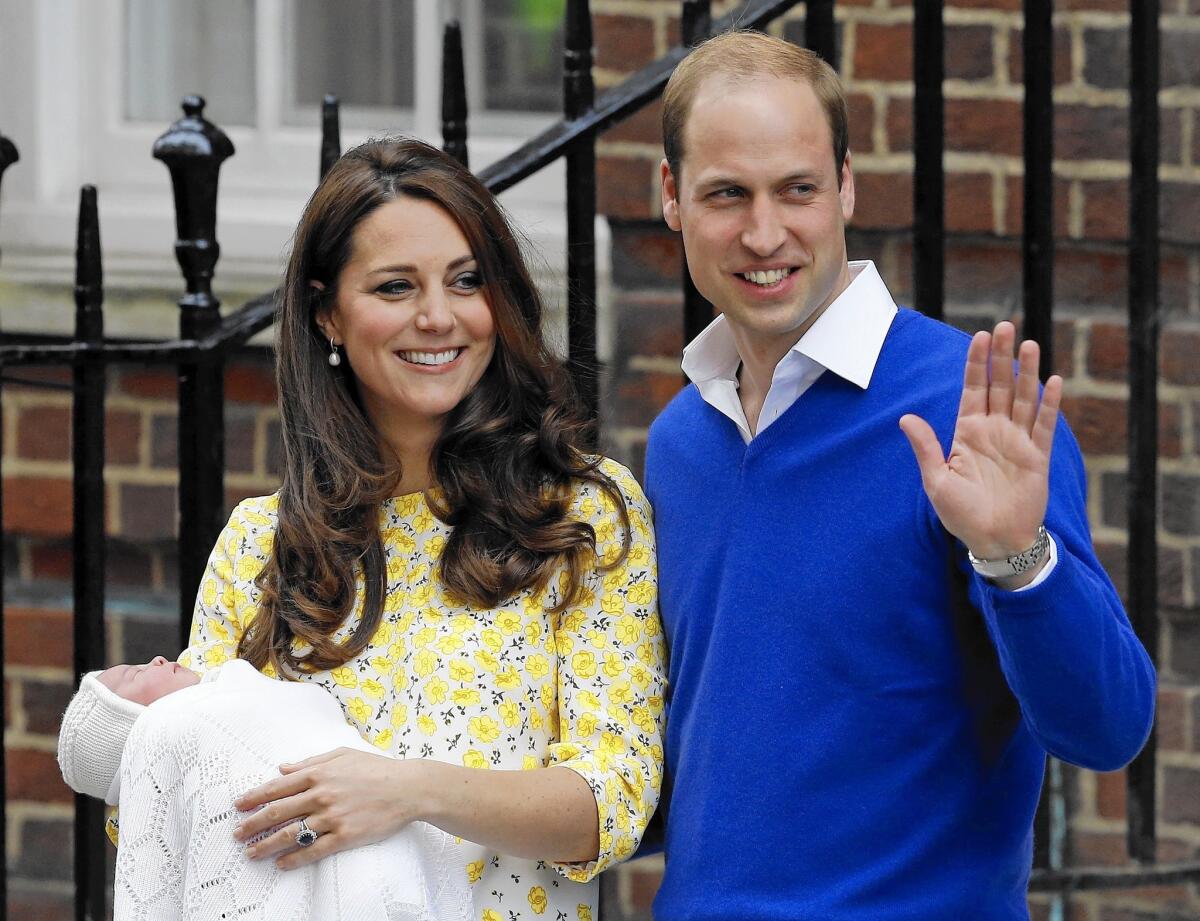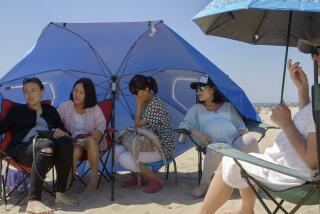British princess’ debut causes postpartum shock and awe in China

- Share via
Reporting from Beijing — For many mothers around the world, the oh-so put-together appearance of the Duchess of Cambridge and her newborn princess in public last weekend just 10 hours after giving birth was a source of wonder — millions asked: Just how did she manage to look so good?
But for many observers in China, the shock was of a different sort: What mother in her right mind, many asked, would wash her hair, put on makeup and heels and go outside in short sleeves and a skirt immediately after having a baby, let alone take the infant outside with her?
“Britain’s Princess Kate gives birth to baby girl, violates the rules of confinement!” trumpeted a headline from the Shanghai-based news outlet Guancha, ticking off at least five no-nos the duchess committed.
Postpartum confinement is a traditional monthlong period for new mothers in China, with strict rules developed over the centuries about what to wear, eat, drink and more. The Mandarin term, zuo yuezi, literally means “to sit for a month after giving birth.”
The proscriptions vary depending on whom you ask. However, widely acknowledged “don’ts” for new moms, according to these age-old guidelines, include no eating fruits or most vegetables, no drinking anything cold, no showering and no brushing of teeth. Amazon’s Chinese website has an entire section devoted to zuo yuezi, including cookbooks and other manuals.
Mothers with newborns are also expected to cover up in warm clothes (even at the height of summer), refrain from exposing the infant to crowds and avoid activities such as reading, lest they prove too much of a strain.
“What the mother can eat, what she can wear and how much exercise she can do used to be strictly controlled during the first month,” said Zuo Xulei, an obstetrician at Jinshan Hospital of Shanghai’s Fudan University.
According to Zuo, the special diet for a new mother typically consists mainly of soups made of fish or hen soup — believed to stimulate milk production — and eggs as sources of protein.
Although times have changed and Western medicine and customs have gained broad acceptance, the zuo yuezi custom has endured, causing many a kerfuffle for foreigners and Chinese alike.
Sharee Hebert, a 36-year-old American, recalled that when she gave birth to her daughter in Beijing in May 2013, it was a hot day. But when she returned to her hospital room, the nurses refused to turn on the air conditioning, insisting it was bad for her health.
“My hormones were raging and I was so hot throughout the night,” recalled Hebert, who said her husband had to put cold rags on her feet to cool her down.
The cultural clashes didn’t end once she returned home. Upon seeing her American husband bring her a glass of ice water while she was nursing her baby, her Chinese housekeeper “really flipped out,” Hebert remembered. “I don’t know if she thought it would make my milk cold or what.”
A week after her daughter was born, Hebert took the infant to the U.S. Embassy because babies are required to have travel documents by the time they are a month old. As she was going into the building, Hebert said, some Chinese told her that she shouldn’t take such a young child outside — never mind that she and her husband were there to comply with Chinese immigration regulations.
It’s not just foreigners who question the utility of zuo yuezi. Jian Yi, an independent filmmaker and writer who studied and worked in the United States and Britain, said he had a “big argument” with his wife about postpartum confinement after their son was born in 2014. His wife and both sets of grandparents were intent on following the customs as much as possible, he said.
For a month, she did not use any cold water, not even to wash her hands. She also tried not to wash her hair, though eventually she broke down “because it was July, and it was hot,” he said. She tried to minimize activities such as reading, though she did consult books and online sources to learn about topics including breast-feeding. To this day, he said, she believes that doing so weakened her eyes.
Overall, the period was “very hard for her physically and psychologically,” he recalled. “I don’t think it makes sense to do those things, but it’s her body so I guess I should respect her choice.”
For Diana Dzhualova, a Russian who lives with her Chinese husband in Shenzhen, simply taking an apple out of the fridge and eating it when she was a new mother left her mother-in-law in complete shock.
“She just stood there and looked at me with her eyes wide open,” Dzhualova said. “And then she just smiled and said maybe I can eat cold fruits because I’m Russian, and Russians are physically stronger than Chinese.”
But Zuo, the obstetrician, said there is no scientific proof that Chinese women are less hardy than Westerners and require special care after giving birth.
Chen Lei, a representative of the Xi Duo Care Center, which helps Chinese mothers give birth in California, said his clients typically observe only an abbreviated form of zuo yuezi. “For example, in China, women have to stay indoors for a month,” he said, “but our clients only do that for two weeks.”
Chinese women who give birth in the U.S. “recover faster,” he said, pointing to the good weather and “clean food” available stateside as possible explanations. “In China, it is common for women to stay in the hospital for four to five days, even up to a week, whereas they only spend 24 to 48 hours in the hospital in the States.”
Still Chen finds some American postnatal behaviors shocking. “In the States, women who just delivered babies will be given a glass of icy water. That is unbelievable!” he said. “I told my clients, ‘Do not copy this. [Americans] can handle it, you cannot.’”
Kateryna, a Ukrainian married to a Chinese man, said the experience of zuo yuezi — particularly not showering or brushing her teeth — after giving birth to her son in August 2001 repeatedly brought her to tears.
“I was given very oily soup made from an old hen almost four to five times a day,” she said, asking that her last name not be used to avoid embarrassing her family. “Every time I breast-fed my son, even during the night, my whole family would wake up and start heating the soup for me.”
Eventually, though, she came to understand her Chinese mother-in-law was simply trying to look out for her. “She said she had chronic pain in her joints when she became older” that she blamed on not closely following the traditions, Kateryna said. “She didn’t want the same to happen to her daughter-in-law.”
Elisabeth Koch, a Dutch milliner who gave birth to two children in Beijing, said being on the receiving end of so much parenting advice initially undermined her confidence. “Everyone seems to know better how to take care of your baby than you do,” she said. Joining a group of expatriate mothers, she said, provided crucial support.
Hebert said that although she disagreed with many of the detailed restrictions of zuo yuezi, she did appreciate the general concept of a monthlong rest and recuperation period.
“I don’t know why Westerners expect your body to be back in shape immediately,” she said. “After all, it took nine months for your body to make the baby, so of course it’s going to take time to recover.”
Tommy Yang and Nicole Liu of The Times’ Beijing bureau contributed to this report.
More to Read
Sign up for Essential California
The most important California stories and recommendations in your inbox every morning.
You may occasionally receive promotional content from the Los Angeles Times.














